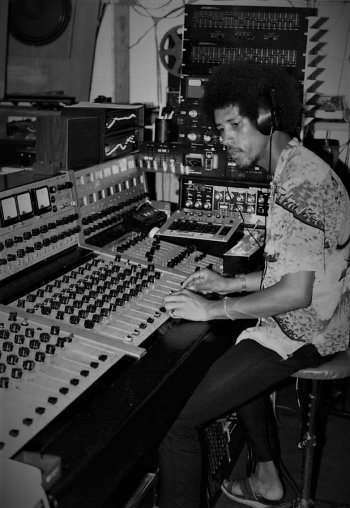EXCLUSIVE INTERVIEW: 5 Mins With… Vik Sohonie
Vik Sohonie is journalist, cultural commentator, DJ and self-confessed “crate digger” whose record collection contains rare and recondite material from across the world. The former contributor to Slate is also the founder of Ostinato Records, who on Friday released a searing compilation called Synthesize The Soul: Astro-Atlantic Hypnotica From The Cape Verde Islands 1973-1988.
A truly interesting, eclectic mix celebrating the historical moment when traditional Funana forms encountered the synthesiser, the result is a compilation that takes the listener on an exciting voyage of discovery, as the heavily syncopated rhythms are punctuated by off-kilter, ethereal synth lines, surprising organ swells, proto-dub scratches and other electronic flourishes. It’s a record that will challenge your preconceptions about the origins of electronic music (not to mention Cape Verdean musicians’ status as innovators in this field), and give you an expertly curated experience of one of the late-20th Century’s most thrilling musical encounters.
We caught up with engaged, erudite Vik Sohonie to talk about this exciting release, which has already earned attention from Vice magazine and been declared Record of the Week at Sounds of the Universe in Soho – not to mention sending electronic musicians everywhere scurrying for their sample units…
Where did your interest in music from Cape Verde stem from?
I’ve been very passionate about Lusophone African music for some time, having worked on the Angola Soundtrack compilation with Analog Africa in 2009, which won a German Critics Prize. Before that, I was obsessed with older compilations: Angola 70, Soul of Angola, a massive CD boxset with the 100 greatest songs from Angola, and an amazing remix album of old Angolan songs by Brazilian producer Mauricio Pacheco called Comfuseos Vol. 1.
The African Lusophone world fascinated me for the same reason many cultures fascinate me – they are simply not spoken of in the Anglophone mainstream. Lusophone Africa was this cordoned off, inaccessible realm for someone who operated very much in the Anglo-American world, having grown up in former British colonies and lived in the United States. But the deeper I dug, the more I was introduced to and the more I learned about the music of Guinea Bissau, Sao Tome, and eventually Cape Verde – and it captured my imagination. It literally possessed an element of every music style I grew up listening to. It was, in some ways, the perfect music; the perfect exemplar of Black Atlantic culture.
But the music I initially came across from Cape Verde was what myself and many others associated with the islands – the slower mornas and coladeiras. “This is what they produce – no more, no less,” was what I thought. Surely they couldn’t have been on the forefront of the electronic music movement, creating sounds that preceded what would eventually come out of Chicago, NYC, and London a decade later? But that was the case, and when I came across the electronic sounds of Cape Verde, it was one of those rare epiphanic moments.
Our understanding of where our music comes from is built on mendacity, but these kernels of truth that can shatter your perception of history are what it’s all about. Cape Verde’s 1980s music should shatter every conception you’ve been fed about Africa and its relationship to musical innovation.
Talk a little bit about the interesting connection between Verdean musicians gaining independence (from Portugal, following the Carnation Revolution) and them ‘going electronic’. What was it about this particular historical moment, in your eyes, that inspired this evolution?
As mentioned in the first question, the Lusophone realm was heavily sealed off. This was a direct policy of the Portuguese military dictatorship. All of Portugal’s exploits were shrouded in immense secrecy. Remember, the Portuguese colonies in Africa were, along with French Djibouti, the very last to gain independence (in 1975). That’s only 42 years ago! So, while the world was focused on Vietnam, a horrific war we associate with the use of napalm against civilians, you almost never hear about the napalming of Mozambique by Portugal during the same time, nor do you hear about the massive contingent of Portuguese troops fighting in Angola and Guinea Bissau. These colonial designs isolated these countries so completely that by independence they were ill-equipped to perform or integrate into the largely Anglo-American led global economy. They were detached, disconnected, and discarded from a rapidly advancing world.
What electronic instrumentation and electronic sounds offered Cape Verdean musicians, whose country did not have oil to gain notoriety like Angola, was a chance to integrate with the modern world. They didn’t view the synthesiser as just a new gadget, but it was a gateway to globalisation. Here was an instrument and a sound that signified modernity, in an archipelago where modernity was in short supply. When musicians emigrated to Europe, their experience with electronic instruments carried with it a promise of lifting a centuries-old isolation.
Our global economy is governed by the principle of comparative advantage, which basically says you should produce, create, and export what you’re good at. It’s a horrible capitalist principle, but going by it, it’s why Thailand has made its cuisine a cornerstone of its foreign policy, using it as a way of connecting the country with the world. Cape Verde’s Ministry of Culture has effectively done the same for Cape Verdean music. It’s their way of integrating, then and now, in a hyper-competitive, deeply globalised world that benefits a few at the expense of plenty.
What was the impulse behind establishing Ostinato Records?
In the last two decades, the West’s dominance over popular culture and monopoly on information has slowly but steadily declined, and that vacuum has been filled in a number of ways – through the rise of news networks dedicated to the Global South’s point of view, and through record labels. Western media, academia, and its cultural companies taught us how to view the world, what to focus on and what to ignore, who to hate and who to love. That’s all changing.
I was born in India, I grew up in the Philippines, Thailand, Singapore, and the United States. I’ve also spent extended periods of time in Germany, Haiti, West and East Africa. I am very much a global citizen, but I am also a son of the Global South, of the third world, of the former colonized world, and I think it’s high time our (African, Asian, Latin American, Arab) stories, culture, and music began dominating the airwaves.
As a former journalist, I saw the dominant worldview by which most mainstream news, and journalism schools, operate – it’s deeply outdated and has no place in 2017. So, I aim, through Ostinato Records releases, to tell stories that challenge notions and perceptions that have wrongly coloured the global imagination.
The music is important, it’s the centrepiece, but it’s also about bringing a global perspective to understanding and appreciating music.
Lastly, and this is important, if you look around the major indie labels today focusing on “world music”, they are largely based in Europe, and run by Europeans. Their colonial history and generous funding for the arts affords them access to these sounds and cultures that others might not have. I’ve seen first-hand, for example, the immense help the Goethe Institute provides to German labels, allowing them to thrive. It’s an advantage that is non-existent in most parts of the world. It makes it difficult to compete, but this is a niche industry in desperate need of diversity – of both skin color and thought – and, unless I’m mistaken, I am the first Indian to build a label dedicated to African music. My hope is that one day, for example, there’s a Nigerian label compiling Russian music. Hey… that’s the way the world is headed!
Do you believe there is still a role for “ethnomusicology” in the modern world?
The term “ethnomusicology” is outdated, outmoded, and should not really be used – even though it still largely is in academia. The terms ‘ethno’ or ‘ethnic’ harbor connotations of the ‘other’. It’s a Western term that basically said everything that isn’t from Western Europe, North America, Australia, and maybe Japan, should be classified as ‘ethnomusicology.’ You hear the term ‘ethnic food’ too, and it’s pretty gross. We still haven’t completely done away with “world music”, either, another cringe-worthy term.
There will always be a role in studying, understanding, appreciating, and immersing oneself in the musical culture of others – but I think that immense privilege and power, should, and is, migrating from academia to private labels such as my own. We have to treat and appreciate musical cultures within their own historical contexts: their own ways of seeing, being and thinking. The diversity of humanity is far too rich and complex to place any of it under any umbrella, no matter how much easier it is to market it that way.
I try to hyper-focus my compilations, giving the specific music culture, style or time period the spotlight it deserves. I genuinely hope there’s an end to releases like Caribbean Funk Vol. 2 or African Club Music Vol. 15. That kind of approach has no place in today’s world, and neither does anything that classifies and hyphenates the cultures of the Global South as “ethno-” anything.
How are you feeling about 2017? How do you think musicians will respond/how do you hope they will respond to the general climate of uncertainty and upheaval that the world is experiencing right now?
From a political point of view, 2017 is going to be the greatest year of structural global change since 1945 – for better or worse, though I fear mainly the latter. From the standpoint of a record label and a keen follower of cultural trends, this will be one of the most creatively fertile years in recent memory.
Why? Let’s look back at the last time you had this much right-wing thinking in the air and in power – it wasn’t the 1930s, it was the 1980s. This was a transformative decade in so many ways. The major gains made by social movements, by anti-colonial movements, by civil rights movements, were rolled back in many nefarious ways that I won’t go into here. The Reagan era in the US, which did untold harm to Black Americans, in many ways gave rise to the hip-hop movement. Hip Hop was one of the single greatest modes of cultural resistance against an oppressive, violent state, that then blossomed into a multi-million dollar music industry. Just listen to the lyrics of early, socially conscious hip hop, and you’ll understand why it was being made.
So in the same vein, Donald Trump’s corporate coup of the US, along with all the right-wing nut jobs in power, or taking power, all over the world, will usher in a new generation of artists, styles, projects, and productions that will see themselves as vital members of the resistance. The world has changed. Asia will soon be the centre of the global economy. Africa’s middle class is steadily growing. I was surprised by the progress even Somalia has made when I visited. Latin America has come a long way, albeit with many challenges ahead. The Donald Trumps of this world represent the last stand of an old elite that are losing their status and their power. The longer they try to hold onto it and transform the world in their outdated image, the greater the artistic resistance will be, and not just from the US, but worldwide.
Goran Hugo Olsson’s documentary Fonko details the musical revolutions taking place in Africa today. This will only grow, and the youth movements in the West resisting right wing rule will ally themselves with their like-minded kin across the world, much like how the protesters in Ferguson, Ohio found solidarity with the people of Gaza. And let’s put it this way: two of my releases this year will be from two of the seven ‘banned’ countries [under Trump’s new immigration laws]. I planned these long before Trump was elected. The resistance to creeping fascism and unchecked neoliberalism has been growing for some time, and we will all resist the best way we know how. Though music, of course, is the best weapon.
Synthesise The Soul: Astro-Atlantic Hypnotica From The Cape Verde Islands 1973-1988 is out now on Ostinato Records.
Here is the full tracklist:
1. “Nós Criola”, Nhú De Ped´Bia
2.”Nanda”, Pedrinho
3.”Corpo Limpo”, Tulipa Negra
4. “Jelivrà Bo Situaçon”, Manuel Gomes
5. “Dança Dança T’Manche”, Val Xalino
6. “Bo Ta Cool”, Jovino Dos Santos
7. “Farmacia”, Abel Lima
8. “Chump Lopes”, Elisio Gomes & Joachim Varela
9. “É Bô Problema”, Tchiss Lopes
10. “Babylon 79”, Americo Brito
11. “Djozinho Cabral”, José Casimiro
12. “Posse Bronck”, Nho Balta
13. “Lameirao”, Kola
14. “Nova Coladeira”, Cabo Verde Show
15. “Melhor Futuro”, Tam Tam 2000
16. “Chema”, Pedrinho
17. “Mie Fogo”, Dionisio Maio
18. “Canta Cu Alma Magoada”, Bana




Leave a Reply